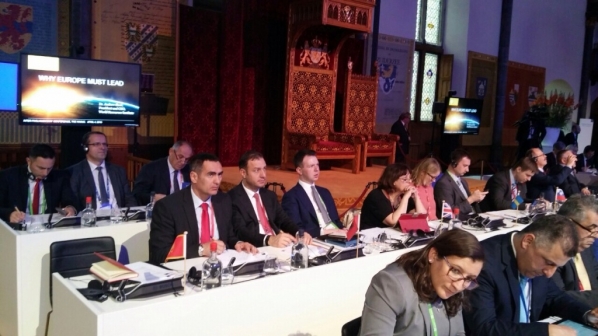Ms Khadija Arib, President of the House of Representatives of the Dutch Parliament, welcomed the participants at the beginning meeting, saying that this type of the meeting, aimed at exchange of opinions on the issues of common interest, such as energy, presented a useful platform for improving inter-parliamentary cooperation.
Ms Esther-Mirjam Sent, Chairperson of the Committee for Infrastructure, Environment and Spatial Planning, chaired the first part of the conference.
The following delivered introductory remarks: Mr Maroš Šefčovič, Vice President of the European Commission in charge of Energy Union, Mr Karmenu Vella, European Commissioner for Environment, Maritime Affairs and Fisheries and Mr Henk Kamp, Dutch Minister of Economic Affairs.
Introductory remarks were focused on how to speed up the cost-effective transition towards a clean, competitive and secure energy future. They stated that environment was of a key importance for economy, and that states should have sustainable production of energy. Also, renewable sources of energy will have an important role in the production of electricity and heat with reduced CO2 emissions. Participants stressed the importance of circular economy, which, with the support of the EU funds, would lead to significant innovations in the field of environment protection, and transition from so-called “fossil” to “green energy”.
They also had an opportunity to learn about innovative projects of energy sustainability of various Dutch provinces.
In the continuation of the conference a panel discussion was opened, chaired by the Ms Roos Vermeij, Chairperson of the Economic Affairs Committee of Dutch Parliament. The participants were addressed by: Fatih Birol, Executive Director of the International Energy Agency, Mr Andrew Steer, President of the World Resources Institute and Mr Feike Sijbesma, DSM’s Managing Board of Directors. The panel discussion pointed out that currently low prices of fossil fuels significantly complicate the transition to sustainable energy development, and one of the ways to overcome the risks is the creation of a single energy market within the EU, with clear regulatory rules and binding mechanisms of financing sustainable energy projects. They emphasised the need for rapid ratification of the Treaty of Paris, for which it is necessary to determine the precise deadlines and rules. This topic will be the focus of the next meeting of energy ministers at the EU level, which is to be held in Amsterdam this month.
In the second part of the conference, four parallel sessions were organised, addressing topics of: energy infrastructure and security of supply, energy savings, renewable energy and circular economy.
The Chairperson of the Committee on Economy, Finance and Budget took part in the session devoted to renewable sources of energy, where he spoke on the need for resolving conflicts between fossil fuels which are relatively cheap in this moment i.e. oil and the need to invest in relatively still expensive projects of renewable energy, primarily in hydropower resources, but also in intensifying the use of solar and wind energy. With regard to that, it was pointed out to the need of defining sustainable sources of financing investments in energy sources, and so-called special tax on fossil fuels “carbon tax” has been recognised as one of the key models, which would be used, with the support of EU funds and the banking sector, solely for the purpose of new investment and tax incentives for investments in renewable energy sources.
Panellists of the session on renewable sources of energy were: Mr Mario Ragwitz, Head of the Unit for Renewable Energy at the Institute Fraunhofer ISI, Mr Rik Siebers, CEO at the REDstack, Mr Matthias Buck, Senior Associate EU Energy Policy and Ms Agora Energiewende.
Upon the completion of the parallel sessions, the final session was held, where the participants exchanged experiences on the application of good practice of parallel sessions; the final session was chaired by Ms Roos Vermeij, Chairperson of the Economic Affairs Committee of Dutch Parliament.









